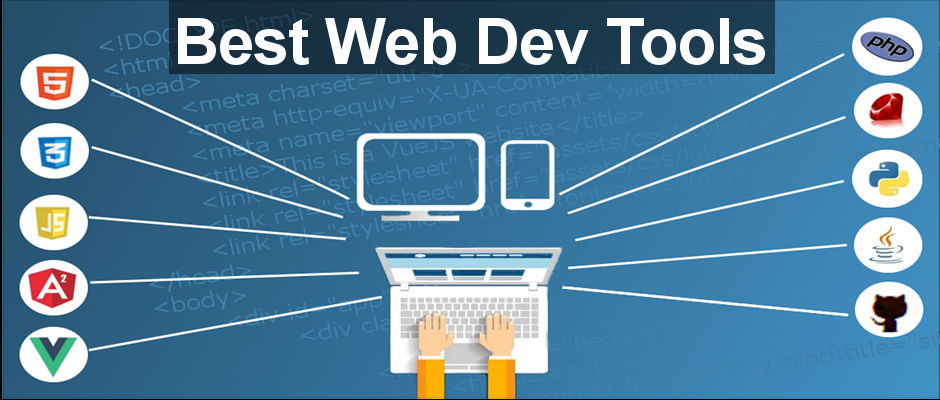Are you diving into the world of web development but feeling overwhelmed by the myriad of tools available? Fear not, as we’ve curated a list of the top 10 essential tools that every beginner should have in their arsenal. Whether you’re building your first website or honing your coding skills, these tools will streamline your workflow and propel your projects to new heights.

Conquering Your First Website: 10 Essential Web Development Tools for Beginners
Congratulations on taking the plunge into the exciting world of web development! Whether you’re crafting a personal portfolio, a blog for your dog’s impressive skateboarding skills (hey, it could be the next viral trend!), or building a website for your local bakery’s famous sourdough, you’re on your way to creating something amazing.
But hold on there, aspiring web whiz – diving headfirst into code can feel overwhelming. Fear not! A treasure trove of tools exists to make your web development journey smoother, more efficient, and even…dare we say…fun? Let’s explore ten essentials that will empower you to turn your ideas into stunning websites.
1. Chrome DevTools: Your Built-in Debugging Buddy
Every web developer’s best friend (besides copious amounts of coffee), Chrome DevTools comes pre-installed in your Google Chrome browser. This suite of superpowers lets you inspect every nook and cranny of a webpage, fine-tune styles, and even debug any errors that might be lurking in your code. Imagine being able to see exactly how a website is built, line by line – that’s the magic of DevTools!
2. Text Editor: Craft Your Code with Comfort
While some hardcore developers swear by coding directly in their browsers, a trusty text editor is a must-have. Think of it as your digital canvas where ideas take shape. Popular options include Visual Studio Code, a free, open-source editor with a massive community and endless customization possibilities. Sublime Text is another favorite, known for its lightning speed and clean interface.
3. Version Control with Git: Never Lose Your Work Again
Imagine pouring your heart and code into a website, only to accidentally delete a crucial line and send your project into a tailspin. Shudders. Version control systems like Git are lifesavers, allowing you to track changes, revert to previous versions, and collaborate seamlessly with others. It’s like having a time machine for your code – pure magic!
4. Harness the Power of Frameworks: Bootstrap for the Win
Frameworks like Bootstrap are like pre-made building blocks for websites. They provide a foundation of HTML, CSS, and JavaScript that you can customize to create beautiful, responsive websites that adapt to any screen size. Bootstrap offers a vast library of pre-built components like buttons, forms, and navigation bars, saving you tons of coding time and frustration.
5. CodePen: Your Playground for Experimentation
Feeling like you need a break from the grind? Dive into CodePen, an online playground where you can experiment with HTML, CSS, and JavaScript and see the results instantly. It’s a fantastic way to test snippets of code, practice new techniques, and even discover cool design ideas from other developers. Plus, you can share your creations with the community, making it a great platform to learn and grow.
6. Don’t Fear the Command Line: It’s More Powerful Than You Think
The command line might seem intimidating at first, but it’s a powerful tool that can automate tasks, manage projects, and make your life as a developer much easier. Think of it as a way to give your computer concise instructions. There’s a learning curve, but trust us, the feeling of accomplishment after mastering a new command is unbeatable.
7. Level Up Your Design Skills with Figma or Adobe XD
While coding brings websites to life, stunning design is what keeps users engaged. Tools like Figma and Adobe XD allow you to create mockups, user interfaces (UIs), and prototypes before you write a single line of code. This visual planning stage helps ensure your website is not only functional but also aesthetically pleasing and user-friendly.
8. Web Design Inspiration: Behance & Dribble
Feeling creatively blocked? Hop on Behance or Dribble, online communities bursting with inspiration from designers around the globe. Explore website design trends, discover innovative layouts, and get inspired for your next project. Who knows, you might even find your next design hero!
9. Stock Photo & Icon Libraries: Visuals Make a Difference
High-quality images and icons can elevate your website’s design and user experience. Sites like Unsplash and Freepik offer massive libraries of free stock photos and icons, ensuring you find the perfect visual elements to complement your website’s style.
10. The Power of Online Learning: There’s Always More to Know!
The beauty of web development is that there’s always something new to learn. Platforms like Udemy and Coursera offer a treasure trove of online courses from beginner to advanced levels. Whether you want to delve deeper into specific programming languages.
10 essential web development tools serve as the building blocks for success in your journey as a beginner developer. From writing code to designing interfaces and analyzing performance, each tool plays a crucial role in shaping your skills and advancing your projects. So roll up your sleeves, dive in, and let the coding adventures begin!